Steemian Friends,
Today is the fifth week of Steemit Learning Challenges 21. This week, We will create a lesson on a very important topic for students. We all know the name of solar power, among renewable energy. We will teach the students about the basics of solar power. We think that the use of solar power or renewable energy should be increased to protect the future world from pollution. We are starting with some basics of solar power generation.
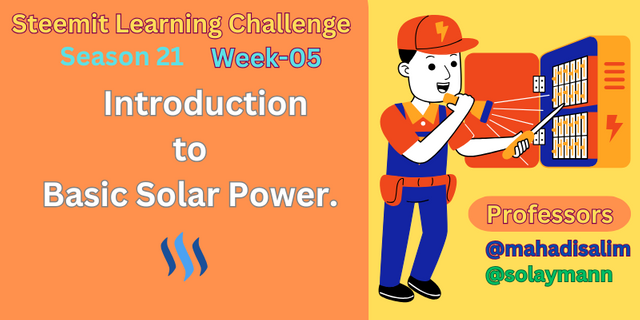
Solar Electricity:
Almost everyone is familiar with solar electricity. Electricity is generated in different ways around the world, but we generate the most electricity from fossil fuels. Solar power is the conversion of sunlight's heat energy into electricity. Sunlight is converted into electricity through PV or photovoltaic cells.
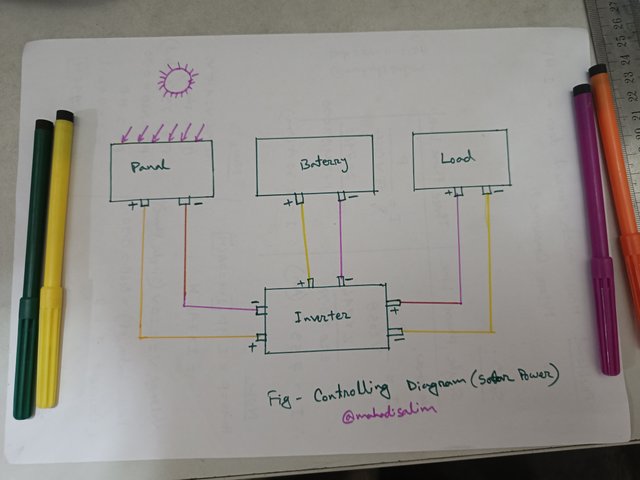
Index:
- Solar Electricity
- Electrical load calculation
- Types of Solar Power
- DC solar power
- AC solar power
- Prepare solar power specifications by calculating electrical loads
Before we learn about solar electricity, we need to learn about the electrical load of our home. We need to know the rating of electrical elements in our house. We calculate the electrical load of our house to show an example. Below is the electrical load of my house.
| Electrical Elements Name | Rating | Quantity | Total Power |
|---|---|---|---|
| Light | 30 Watt | 3 Pcs | 90 Watt |
| Fan | 70 Watt | 4 Pcs | 280 Watt |
| Air Condition(AC) | 1500 Watt | 1 pcs | 1500 Watt |
| Blender Machine | 300 Watt | 1 pcs | 300 Watt |
| Rice Cooker | 1000 Watt | 1 pcs | 1000 Watt |
By calculating the above electrical loads, I found a total load of 3170 watts or 3.170 KW in my house. Here, 1000 Watt = 1 KW is assumed. We expect each of our students to be able to calculate the electrical load of their own home.
In previous lessons, we learned that electricity is of two types: AC and DC. Solar electricity is also of two types: AC and DC. We discuss AC and DC solar power below.
AC and DC solar systems should be developed based on the electrical load used in our homes. If our house's electric lights and fans are DC-powered, then we need to generate DC solar power. DC solar power is less expensive to generate, but it has some application limitations. We have shown below how to make a DC solar power system by calculating the DC electrical load of my house as an example.
My house has the following DC loads:
| Electrical Elements Name | Rating | Quantity | Total Power |
|---|---|---|---|
| Light | 5 Watt | 3 Pcs | 15 Watt |
| Fan | 20 Watt | 2 Pcs | 40 Watt |
According to the above electrical load, my house has a total electrical DC load of 55 watts. Then, I will purchase a DC solar power system according to the above load or specifications.
| Solar Material Name | Quantity | Range |
|---|---|---|
| Solar Panel | 1 Pcs | 100 W |
| Charge Controller | 1 Pcs | 10 A |
| DC Light | 3 Pcs | 5 Watt |
| DC Fan | 2 Pcs | 20 Watt |
| Battery | 1 Pcs | 100 AH |
Stands for required cables and panels will be required based on the location of the solar project.
Solar Panel:
Our electrical load was 55 watts. But we have increased the solar panel by 100 watts. A minimum of 20% extra from the load should be kept in solar panels. Solar panels from different companies are available in the market based on efficiency. You can use two 50-watt solar panels if you want.
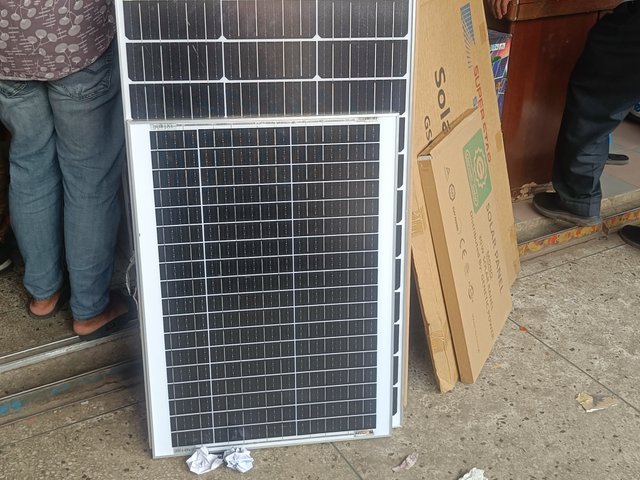
Charger controller:
Due to our low load, we have used a 10 amp charger controller. Charger controllers are available in the market for up to (10-60) amps. The job of the charger controller is to charge the battery with the electricity generated from the solar panel and send it to the load. If there is a problem with the solar panel, it is controlled by giving a signal. We will use a charger controller in the DC solar power system.
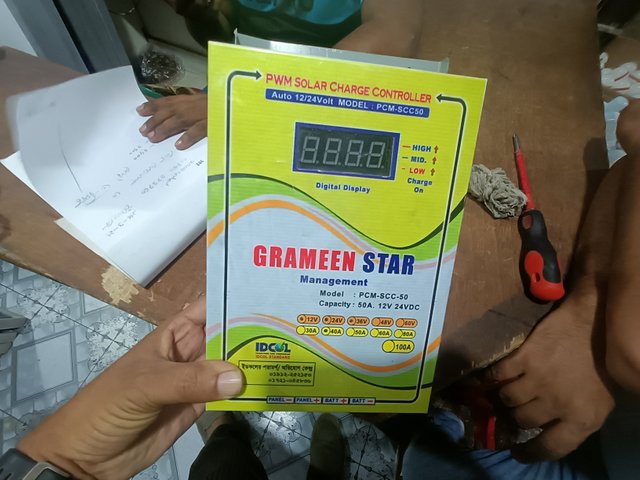
PWM Solar Charger Controller
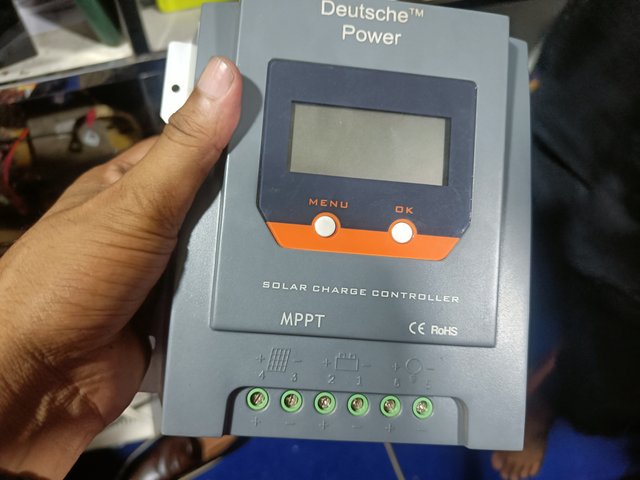
MPPT Solar Charger Controller
Solar Battery:
We have used a 100 AH battery for the above load. Batteries are mainly used to store electricity. Backups are provided, especially after the sun goes down. As long as we get sunlight, we can run lights and fans with solar panels without batteries. So, we recommend installing batteries based on your backup power. The more battery capacity you put in, the more backup power you get. The battery costs a little more.
We have drawn the block diagram of a DC solar system below. Hopefully, our students can design a DC solar system by looking at the block diagram.
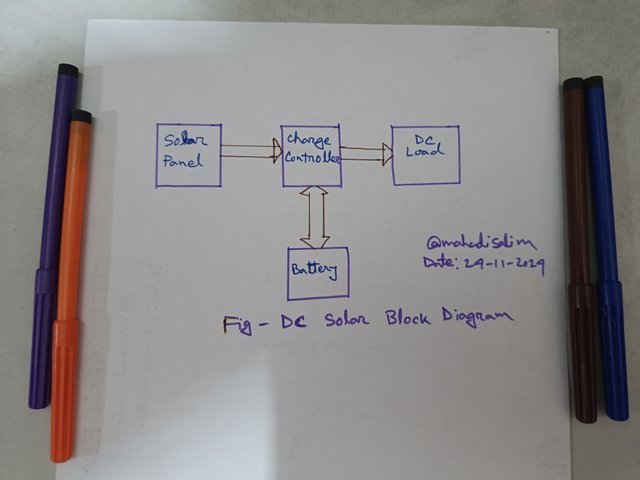
AC solar systems cost more to build than DC solar systems, but they have more advantages. Most of the electrical load in our house is AC power, so using an AC solar system is most useful for us. Below, we have shown some AC load calculations of my house to make an AC power solar system.
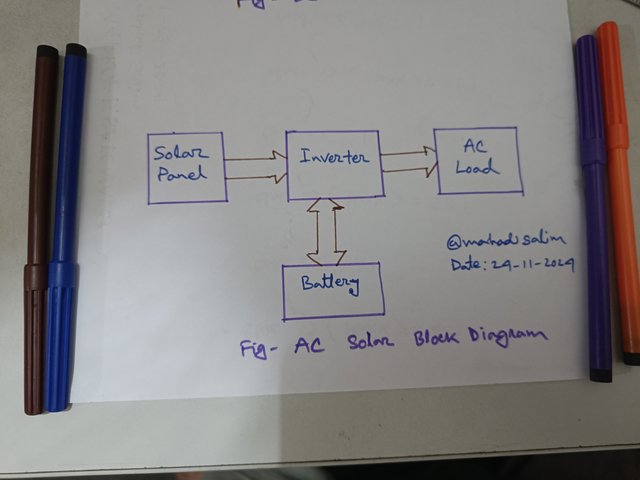
| Electrical Elements Name | Rating | Quantity | Total Power |
|---|---|---|---|
| Light | 30 Watt | 2 Pcs | 60 Watt |
| Fan | 70 Watt | 2 Pcs | 140 Watt |
My house has the above AC power load. The following AC solar system is to be constructed to provide 200 watts of AC power in my house.
| Solar Material Name | Quantity | Range |
|---|---|---|
| Solar Panel | 3 Pcs | 100 W (300Watt) |
| Inverter | 1 Pcs | 800 VA |
| Battery | 1 Pcs | 200 AH |
Solar panel:
For our 200-watt load, we will use a 300-watt panel to purchase three 100-watt panels. We can also use two 150-watt panels if we want. Calculate the wattage according to the panel demand in your market.
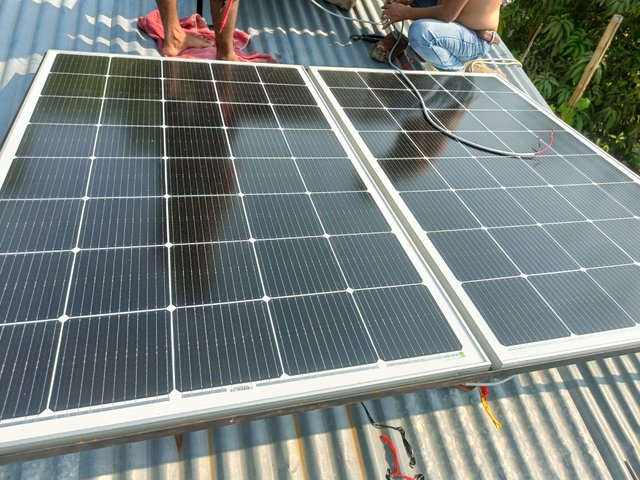
Inverter:
We have used a charger controller in a DC solar system, but we will use an inverter in an AC solar system. Inverters convert the electricity obtained from solar panels or batteries into AC electricity. An inverter costs more than a charger controller, and because an inverter has a charger controller internally, it is additionally used in the AC solar system.
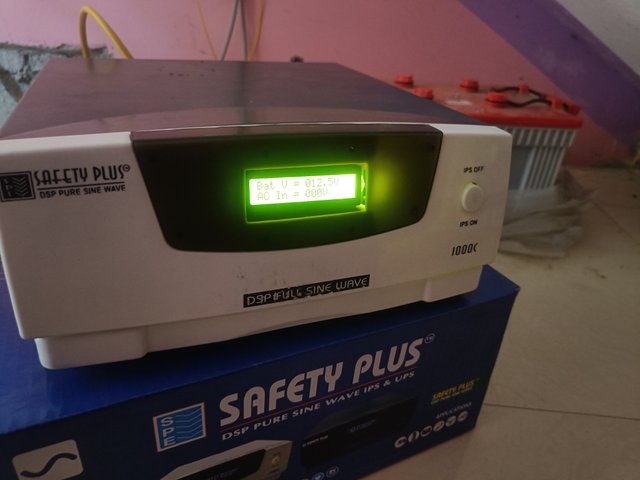
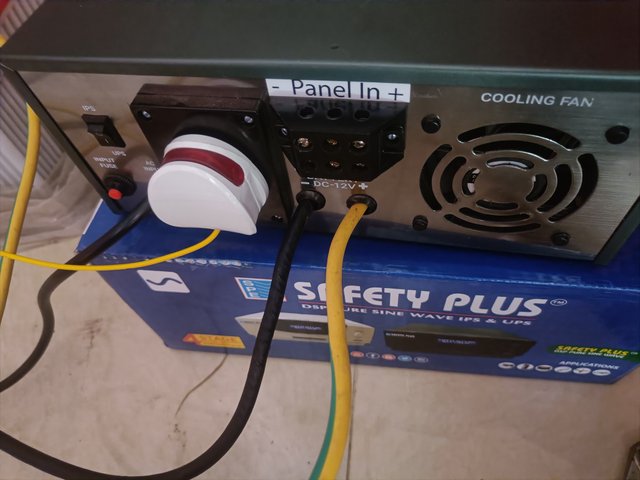
Our dear @ubongudofot sir has the most experience with solar power. He built big solar power projects, and I was inspired by his writing about solar power on the Steemit platform. Tell our students to contact @ubongudofot sir to learn more about solar power. Sir has a solar power shop. There is a community called Solar Steem where solar power installations are discussed. You can all learn more about solar power by reading the community posts.
A. Share your knowledge about solar power with us by reading our lesson.
B. Write three important differences between AC solar and DC solar systems. (as learned from our lesson)
C. Calculate your home's electrical load and share it with us. Follow our lesson as an example.
D. Prepare a DC solar project specification for a customer's home to use four 5-watt lamps and three 20-watt fans.
E. Prepare specifications for a customer's AC solar system to drive a water pump motor of 1 HP or 746 W and write the function of each device.
You can go to a solar shop and get the prices and specifications of the following solar products, without having to purchase them.
- Solar Panel (100 W)
- Charger Controller (10-60)A
- Battery (Any Ratings)
Or,
Visit any home or office solar projects near you and share names and photos of solar materials.
Marks Distribution:
| Sl. No | Marks |
|---|---|
| A | 1 Marks |
| B | 1 Marks |
| C | 1.5 Marks |
| D | 3 Marks |
| E | 3.5 Marks |
I have some solar power learning parts on the Steemit platform. Hopefully, our students can learn by watching the learning part.
| Part-01 | Part-02 | Part-03 | Part-04 | Part-05 | Part-06 | Part-07 | Part-08 | Part-09 | Part-10 |
|---|
| Part-11 | Part-12 | Part-13 | Part-14 | Part-15 | Part-16 | Part-17 | Part-18 | Part-19 | Part-20 | Part-21 |
|---|
- Your title should be "SLC21/WK5: Introduction to Basic Solar Power"
- The content must be #steemexclusive.
- The article must contain the tag #electricity-s21w5.
- Plagiarism is not allowed.
- The link of your task must be added in the comments of this publication.
- Use the burnsteem25 tag only if you have set the 25% payout to @null.
- You can publish homework in any community and in any language. But don't forget to use the original tag.
- Invite three of your active Steemian friends.
- The participation schedule is between Monday, November 25, 2024, at 00:00 UTC to Sunday, - December 01, 2024, at 23:59 UTC.
SC01/SC02 would check on the entire 17 participating Teaching Teams and Challengers and upvote outstanding content. Upvotes are not guaranteed for all articles.
At the end of the week, we would nominate the top 4 users who had performed well in the contest and would be eligible for votes from SC01/SC02.

Best Regards,
Basic Electricity Teaching Team
@mahadisalim
@solaymann



My entry
https://steemit.com/electricity-s21w5/@daprado1999/slc-21-wk5-introduction-to-basic-solar-power
Downvoting a post can decrease pending rewards and make it less visible. Common reasons:
Submit
This is my Twitter share link :
https://twitter.com/mahadih83660186/status/1860587789554974917?t=my2CvqoTE-RBCwf3ONALQg&s=19
Downvoting a post can decrease pending rewards and make it less visible. Common reasons:
Submit
https://steemit.com/hive-153970/@udyliciouz/slc21-wk5-introduction-to-basic-solar-power
Downvoting a post can decrease pending rewards and make it less visible. Common reasons:
Submit
Excelente propuesta, la energía verde, o la que es libre de hidrocarburos es la más ideal, sin embargo, los costos de adquisición son bastante altos, hay que tener claro el monto a invertir y la durabilidad en el tiempo para poder decidir su utilización, claro está, en aquellas zonas donde tienen acceso a la electricidad normal.
Para aquellos lugares donde no llega el servicio eléctrico es una oportunidad de tener electricidad.
Éxitos.
Saludos
Downvoting a post can decrease pending rewards and make it less visible. Common reasons:
Submit
Dear, solar electricity will be very important for the future world. Especially for some countries. For example, the electricity system of our country Bangladesh is getting worse day by day. Gas shortage is the main reason. Thank you very much for commenting.
Downvoting a post can decrease pending rewards and make it less visible. Common reasons:
Submit
Totalmente de acuerdo amigo, varios países sufren de problemas energéticos y esta es una alternativa que solucionará dicho problema, sin embargo, la economía de muchos hogares les hará muy difícil acceder a esta por el costo de adquisición de los equipos, pero seguro se encontrará la manera de resolver.
Gracias por tu amable respuesta a mi comentario.
Saludos
Downvoting a post can decrease pending rewards and make it less visible. Common reasons:
Submit
My link
https://steemit.com/electricity-s21w5/@josepha/slc21-wk5-introduction-to-basic-solar-power
Downvoting a post can decrease pending rewards and make it less visible. Common reasons:
Submit
My entry
https://steemit.com/hive-118902/@hisgeneral/slc21-wk5-introduction-to-basic-solar-power
Downvoting a post can decrease pending rewards and make it less visible. Common reasons:
Submit
https://steemit.com/electricity-s21w5/@rubee2as1/slc21-wk5-introduction-to-basic-solar-power
Downvoting a post can decrease pending rewards and make it less visible. Common reasons:
Submit
This is my entry link
https://steemit.com/electricity-s21w5/@adese/slc21-wk5-introduction-to-basic-solar-power
Downvoting a post can decrease pending rewards and make it less visible. Common reasons:
Submit
https://steemit.com/hive-170554/@imranhassan/slc21-wk5-introduction-to-basic-solar-power
Downvoting a post can decrease pending rewards and make it less visible. Common reasons:
Submit
https://steemit.com/hive-153970/@gailly/slc21-wk5-introduction-to-basic-solar-power
Downvoting a post can decrease pending rewards and make it less visible. Common reasons:
Submit
https://steemit.com/electricity-s21w5/@simonnwigwe/slc21-wk5-introduction-to-basic-solar-power
Downvoting a post can decrease pending rewards and make it less visible. Common reasons:
Submit
my entry post : https://steemit.com/electricity-s21w5/@hamzayousafzai/slc21-wk5-introduction-to-basic-solar-power
Downvoting a post can decrease pending rewards and make it less visible. Common reasons:
Submit
Here is my entry:
https://steemit.com/hive-118902/@ahsansharif/slc21-wk5-introduction-to-basic-solar-power
Downvoting a post can decrease pending rewards and make it less visible. Common reasons:
Submit
My entry
https://steemit.com/hive-180106/@shano49/slc21-wk5-introduction-to-basic-solar-power
Downvoting a post can decrease pending rewards and make it less visible. Common reasons:
Submit
My entry
https://steemit.com/hive-180106/@shano49/slc21-wk5-introduction-to-basic-solar-power
Downvoting a post can decrease pending rewards and make it less visible. Common reasons:
Submit
https://steemit.com/hive-179384/@waterjoe/slc21-wk5-introduction-to-basic-solar-power
Downvoting a post can decrease pending rewards and make it less visible. Common reasons:
Submit
My entry
https://steemit.com/electricity-s21w5/@rossnenye/slc21-wk5-introduction-to-basic-solar-power-by-rossnenye
Downvoting a post can decrease pending rewards and make it less visible. Common reasons:
Submit
Mi participación
"SLC21/WK5: Introducción a la energía solar básica"
Downvoting a post can decrease pending rewards and make it less visible. Common reasons:
Submit
Saludos cordiales, por acá dejo mi entrada al concurso.
https://steemit.com/electricity-s21w5/@saulvargasman/slc21-wk5-introduction-to-basic-solar-power
Downvoting a post can decrease pending rewards and make it less visible. Common reasons:
Submit
My entry link
https://steemit.com/electricity-s21w5/@nsijoro/slc21-wk5-introduction-to-basic-solar-power
Downvoting a post can decrease pending rewards and make it less visible. Common reasons:
Submit